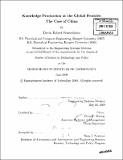| dc.contributor.advisor | Fiona E. Murray. | en_US |
| dc.contributor.author | Fensterheim, Devin Robert | en_US |
| dc.contributor.other | Massachusetts Institute of Technology. Technology and Policy Program. | en_US |
| dc.coverage.spatial | a-cc--- | en_US |
| dc.date.accessioned | 2010-03-25T14:54:38Z | |
| dc.date.available | 2010-03-25T14:54:38Z | |
| dc.date.copyright | 2009 | en_US |
| dc.date.issued | 2009 | en_US |
| dc.identifier.uri | http://hdl.handle.net/1721.1/53057 | |
| dc.description | Thesis (S.M. in Technology and Policy)--Massachusetts Institute of Technology, Engineering Systems Division, Technology and Policy Program, 2009. | en_US |
| dc.description | Includes bibliographical references (p. 127-132). | en_US |
| dc.description.abstract | China is increasingly seen as a participant in the global knowledge economy, with recent studies have highlighted the rising number of scientists and engineers educated in Chinese institutions of higher education, and the growing funding allocated to the production of knowledge. Question remains as to whether China is producing scientific knowledge at the global frontier, and whether the production of scientific research in China is globally competitive. Since the end of the Cultural Revolution in 1976, Chinese policymakers have distinguished scientific modernization as essential to long-term economic prosperity and endogenous growth, and, more recently, to addressing the modern socioeconomic and environmental challenges confronting China. The State Council, largely through the Ministry of Science and Technology and Ministry of Education, have invested heavily in universities and research institutes to promote the development of world-class research. To evaluate the state of scientific innovation in China, three bibliometric analyses are conducted. First, United States patents with full or partial Chinese ownership are used to provide a measure of high-impact industrial and applied innovation. Second, all SCI-indexed articles affiliated with at least one Chinese institution are evaluated. Finally, articles published in the journal Nature and subject-specific Nature journals are used as a proxy for high-impact scientific research. The results suggest that while the majority of Chinese scientific research is of low impact, that frontier research is becoming increasingly common in a growing number of Chinese institutions. | en_US |
| dc.description.abstract | (cont.) There is evidence of a learning effect, suggesting that China engages in international consortia to participate in frontier research and uses the resulting experience to independently produce frontier knowledge, particularly in the fields of genetics and nanotechnology. | en_US |
| dc.description.statementofresponsibility | by Devin Robert Fensterheim. | en_US |
| dc.format.extent | 132 p. | en_US |
| dc.language.iso | eng | en_US |
| dc.publisher | Massachusetts Institute of Technology | en_US |
| dc.rights | M.I.T. theses are protected by
copyright. They may be viewed from this source for any purpose, but
reproduction or distribution in any format is prohibited without written
permission. See provided URL for inquiries about permission. | en_US |
| dc.rights.uri | http://dspace.mit.edu/handle/1721.1/7582 | en_US |
| dc.subject | Engineering Systems Division. | en_US |
| dc.subject | Technology and Policy Program. | en_US |
| dc.title | Knowledge production at the global frontier : the case of China | en_US |
| dc.type | Thesis | en_US |
| dc.description.degree | S.M.in Technology and Policy | en_US |
| dc.contributor.department | Massachusetts Institute of Technology. Engineering Systems Division | |
| dc.contributor.department | Technology and Policy Program | |
| dc.identifier.oclc | 501809938 | en_US |
